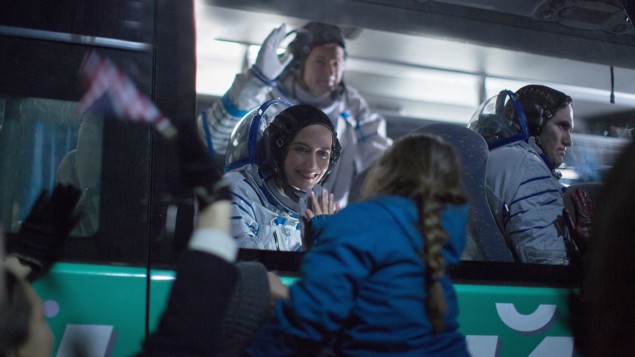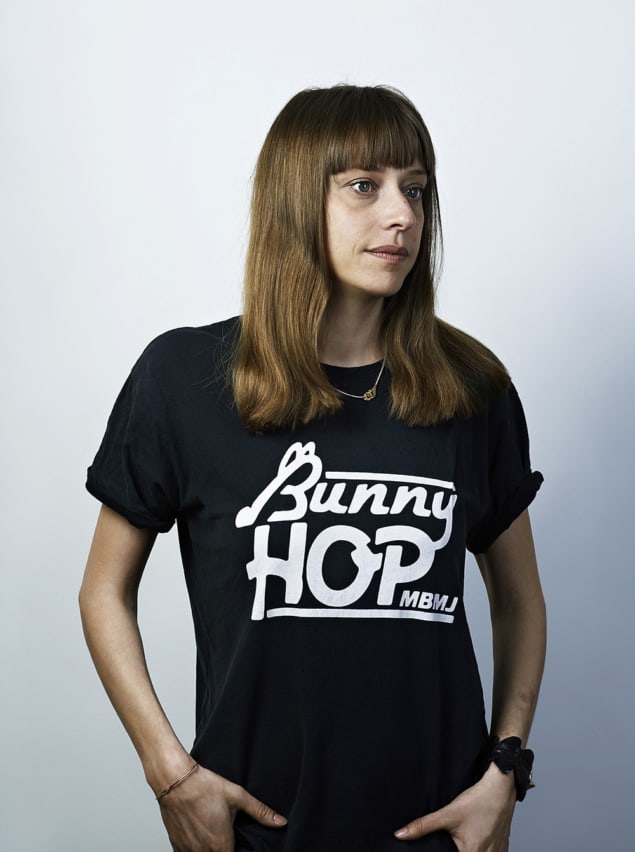Andrew Glester reviews the film Proxima and interviews its writer-director Alice Winocour

The bond between parent and child is undoubtedly a strong one, no matter the complexities involved. Proxima, the latest film by French screenwriter and director Alice Winocour, follows the final weeks on Earth for Sarah (Eva Green), an astronaut preparing for a 12-month stay on the International Space Station. Stunningly shot in part on location in Star City – the cosmonaut training centre in Russia – and in collaboration with the European Space Agency (ESA), the story transpires to be far more firmly rooted on Earth than it is about space.
Proxima explores the various strains, stresses and successes of the relationship between Sarah and her daughter Stella, as she prepares to leave for her long and dangerous journey. This is a film about a mother who is an astronaut, and an astronaut who is a mother. Green’s performance is exceptional, as her character treads the difficult line so many people must between being a good parent, while also excelling in their career.
It would be only fair to compare and contrast Proxima with two recent blockbuster sci-fi films that explore complicated parent-child relationships – Interstellar (2014) and Ad Astra (2019), which have a father–daughter and father–son bond respectively, as a key plot point. But both those films’ stories are juxtaposed against much larger, complex plots that philosophize about other “big questions” in the universe.
Proxima, on the other hand, is a fictional story set in a scientific field – and so in a sense could be thought of as science fiction – but focuses mainly on Sarah’s struggle to get through the gruelling astronaut training and be the best astronaut she can, while also trying to support her daughter and maintain their very close relationship. There are no warp drives or time travel to worry about, but for a space nerd like me, there is a real joy to be had from watching the scenes shot on location in iconic and historic locations such as the Baikonur Cosmodrome. The direction and cinematography in Proxima provide a beautiful aesthetic that is worth catching on the big screen, if you can find one showing it and feel comfortable with the COVID-19 protocols in place.
Another key theme in the film is that of separation. Sarah is separated from Thomas, the father of her child, who is himself an ESA astrophysicist, played impeccably by Lars Eidinger. As Sarah leaves for her training, Stella goes to live with her father, moving countries, joining a new school and most of all, missing her mother. It is clear from early in the film that Thomas is an inattentive father, and Sarah has misgivings about leaving Stella with him. Her struggle with this separation, and her attempts to keep her strong connection with her daughter as she prepares to leave the planet, are at the heart of the film.

Proxima is indisputably a feminist film. We are left with no doubt that life as an astronaut is made harder for a woman than it is for a man, especially if the woman is a parent. Sarah must make decisions about whether to continue with her menstruation in space – the scene was reminiscent of the real-world story of NASA asking astronaut Sally Ride, the first US woman in space, whether 100 tampons would suffice for a week in space – and often has to grapple with equipment and space suits that are primarily designed for men. If that were not bad enough, she is faced with boorish misogyny all too often, not least at the hands of mission commander, Mike Shannon, perfectly portrayed by Matt Dillon.
On first viewing, I was left with some misgivings about what exactly the film was trying to say, especially the finale. It’s difficult to discuss it without straying far into spoiler territory (if that does not worry you, see the final question in my conversation with Winocour below) but suffice to say that I watched Proxima with two other feminists, both of whom were frustrated by the difficult choices Sarah was forced to make throughout the film, and the lack of support she receives. This film does not champion the ability to be a mother and an astronaut with ease. Instead it realistically depicts the many hurdles along the way. Indeed, Proxima portrays the struggles of a highly skilled woman, trying to excel, while battling with the pressures of a broken family and the rigours of preparing to go into space.
At the time of filming, the realities of a quarantine (which all astronauts must go into before a mission, to avoid taking germs to the ISS) were alien to most. Since then, much of the global population has experienced some sort of lockdown. Knowing what we now do, I wonder how many of us would be happy to quit the planet and spend a year with just a handful of others in space. Leaving our family and loved ones behind is surely one of the most difficult things to imagine. Proxima puts that idea centre stage and the result is a fascinating film that left me pondering our lives on Earth, more than our place in the universe.
It also left me with many questions, some of which I put to director and co-writer Winocour. Be warned: there are spoilers in my final question.
What is the film about for you?
I don’t think all films need to have a message – but for me Proxima is about the relationship between a mother and daughter, and the idea of separation. Because this mother is also an astronaut, she has to separate from her daughter and she also has to separate from the Earth. To me there was a poetic parallel between those two things.
When you were initially writing the script, did you come at it more from the astronaut angle, or from the point of view of a mother?
You never really know in the process of writing, but for me, the more I have to talk about something intimate, the more it has to be in another world. In film, particularly in French cinema, people tend to tell autobiographical stories but I find I have to project myself into a distant, unknown world that I want to discover. My first film was set in a psychiatric hospital in the 19th century, and my second was about soldiers returning from Afghanistan – so it can be very different types of things. I am drawn to that. I don’t know why.
When it comes to Proxima, I’ve always had a poetic fascination with space, but I didn’t know anything about that world. So I decided to go to ESA and meet some people. I told them we could do a film about a female astronaut, which was the first core idea to emerge. Then I realized that the thing I wanted to talk about was this complex relationship between a mother and a daughter. You never see superheroines in films with children, but in real life, all the astronauts I’ve met do have children. I wanted to change the perspective and to tell the story from this point of view.
There’s a realism to the film, as much of it was filmed on location in Star City and Baikonur. Was that something of a coup?
I really wanted to have an emotional story and a cinematic story. I was not obsessed with the realistic look of things, but I wanted to film in those places, which are kind of unknown. No popular films had been shot there, yet when I went to Kazakhstan it was the place from which all passenger rockets leave the Earth. Now there is SpaceX flying from the US, but at that time it was only Baikonur. That made it a very emotional place and to shoot there was inspiring for the actors too.
There was something exhilarating about the whole adventure of making the movie. We were like the astronauts, working with people from different countries. We had a German crew, a Russian crew, a French crew and the Kazak crew. I was really thankful to have ESA support. I told them “There are so many movies that show the work of NASA. We need one to show your work, and that of the Russians. When people think about space, thanks to movies, they only think of America. In reality, there are all these other space agencies.”
Who did you work with at ESA?
Everyone from the director of communications, to astronauts Samantha Cristoforetti and Thomas Pesquet – who trained Eva Green. I met Tim Peake, who was training in Poland, several times. I spent two years travelling between Star City, Cologne and Kazakhstan when I was writing the script.
Green and I met a lot of astronauts together, including Claudie Haigneré who was a kind of godmother for the film, as well as Canadian astronauts like Julie Payette – all those pictures of women you see at the end of the film. Green was trained by the Russian trainers and they were very hard on her.
Something that surprised me was the misogynistic way in which the mission commander Mike treats Sarah. I’d like to think that that sort of behaviour would be beneath an astronaut in this day and age?
I’m sorry to say that it is worse than you see in the film. As women we are used to that kind of macho way of behaving. Female astronauts experience the same, and there’s a kind of self-censorship that these women have to perform, in order to succeed in their careers. Only 10% of astronauts, in the world, are women. Most women don’t dare to dream that they could do that job or they think that, if they want children, they have to choose between the two.
Proxima shows how hard it is for women. You have to do the same tasks as men, and then more beyond, to prove that you are capable and that you are credible. But these women show they can do it. Ultimately, for me, it is a story of liberation.
This is a major spoiler, but when Sarah breaks out of the quarantine facility the night before they are meant to take off, to keep a promise to Stella, it is really shocking. What was your thinking behind writing that ending?
Quarantine for astronauts is not like a prison. It’s more like something to keep journalists away. To escape is…well, it’s very hard to not want to see your family. While the scenes in the film were something I dreamt up, one of the astronauts I met, Analie Fischer, the first mother in space, told me that she had escaped quarantine from Houston to go trick or treating at Halloween with her daughter. She wanted to spend more time with her. Another astronaut who left quarantine was Jean-François Clervoy, who went to see his son who was very ill at that time with cancer – Clervoy didn’t know if he would see him when he came back. There is a risk of not coming back from a mission. The day of launch is really scary, even for experienced astronauts.
- 2020 Dharamsala/ Darius Films 107 min



